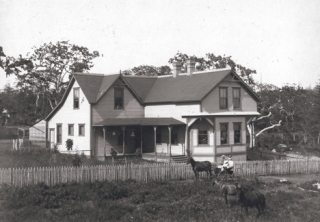By Peggy Darst Townsdin
Special to the News-Times
On Jan. 4, 1851, three young pioneers filed “Donation Land Claims” on this beautiful bay, establishing the site later named Oak Harbor.
The three who claimed the land were Ulrich Freund a Swiss, Martin Taftzon a Norwegian, and Charles Sumner a Yankee.
These three met in San Francisco during the 1848 Gold Rush. An early Puget Sound pioneer Samuel Hancock told them of pristine Whidbey Island. When they came ashore by Indian canoe they stated, “Eureka! We’ve found paradise!”
Edward Barrington, an English /Irish sea captain from Nova Scotia, landed later in 1851 and bought both the Taftzon and Sumner claims thus owning most of the land surrounding this bay. Captain Barrington established the first business in Oak Harbor in 1855, a store, saloon, warehouse, and pier. Barrington shipped timber and goods all over the world.
In 1858 several Irish pioneer families arrived, the McCrohans, Nunans, and O’Learys. Other early Irish pioneers were the Maylor brothers, Harvey Hill, and L.P. Byrne. The Maylors, Hill, and Byrne built stores. Byrne and the Maylors built long piers into the bay as well. By 1890 Oak Harbor was well established with hotels, schools, churches, and social clubs.
In 1859 Barrington, with help from Capt George Morse and John Izett, built the first and only ship in Oak Harbor. She was the schooner “Growler.” She was constructed on the beach next to the store from local fir and oak timbers.
In 1894, attracted by fertile farmlands, a large group of Dutch immigrants from Holland, Michigan arrived. In addition to farming on Clover Valley (now Ault Field, NAS Whidbey), these early Dutch families established businesses and churches. Their quality dairy products and produce were in high demand and shipped throughout the Puget Sound. They contributed greatly to the character and economy of early Oak Harbor.


